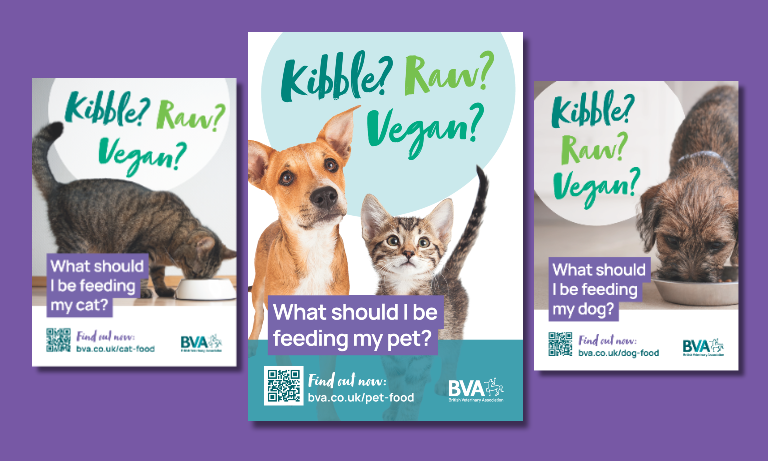British Veterinary Association responds to competition watchdog’s provisional decision and welcomes call for vet practice regulation
15 Oct 2025
The British Veterinary Association (BVA) has launched a new resource to help veterinary professionals support pet owners in choosing a healthy, sustainable diet for their cats and dogs.

With many owners now opting for non-traditional diets for their cats and dogs, the new resource is full of information to help clients navigate potential pitfalls and make evidence-based decisions for their pet.
The new resource answers common client questions such as ‘Is raw food safe for my dog?’ and ‘Can I feed my cat a vegetarian or vegan diet?‘, helping clients to ensure their food choices meet their pets’ nutritional needs as well as reflecting their own personal values and lifestyle choices.
BVA President Dr. Elizabeth Mullineaux said: “We’ve seen a surge in alternative approaches to pet food over recent years as owners look for diets that reflect their own personal values and lifestyle choices. While we support owners making informed choices about what to feed their pets, as veterinary professionals we have a key role to play in guiding clients through these dietary decisions to ensure the health of the pet remains paramount.”
“When it comes to pet diets, there’s so much opinion available to pet owners from breeders, family, friends, online influencers and others, it can be difficult to know which information to trust. We want to support all members of the vet team to feel fully confident in their conversations with clients around alternative dietary options. Our new resource will improve the information available to both vets and clients, supporting owners to make healthy, informed choices for their pets.”
Statistics from BVA’s Voice of the Veterinary Profession survey revealed last year that 94% of companion animal vets have clients who feed a raw diet, 42% have clients who feed meat-free diets and 29% have clients who feed insect-protein in place of meat. However, the data also revealed that many clients were not routinely discussing dietary choices with their vet, as 6 in 10 vets were unsure just how many of the cats and dogs they see are fed meat-free diets.
The resource, launched today with posters and graphics for BVA members, does not attempt to determine the ‘best’ diet for individual pets but rather focuses on supporting pet owners to ensure they are meeting their pets’ nutritional needs as well as meeting their own lifestyle choices. It was developed following the recommendation of a panel of experts, who developed BVA’s position on diet choices for cats and dogs last year.
More long-term scientific research is needed to provide better evidence and improve confidence in alternative diet types. BVA is urging vets to record nutritional histories and any resulting issues on their practice systems to help build a more robust evidence base on the impact of these diets. The BVA policy position also recommends changes to veterinary education to include a new emphasis on the importance of nutrition in day one competencies for vets and nurses, and improved awareness of the need for supportive conversations with animal owners.
BVA also intends to lobby for better labelling of pet food and better labelling and traceability of the animal by products that represent one of the major sources of protein in many cat and dog foods.
Get tailored news in your inbox and online, plus access to our journals, resources and support services, join the BVA.
Join Us Today